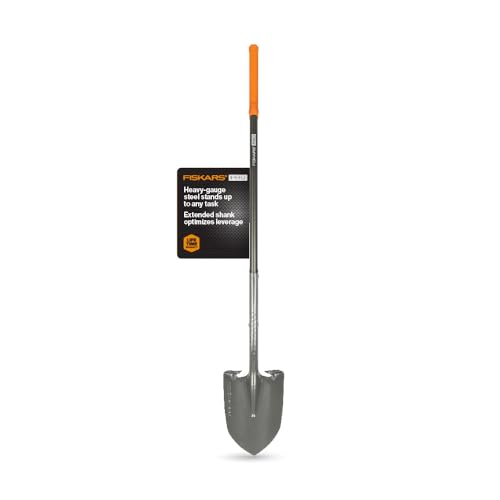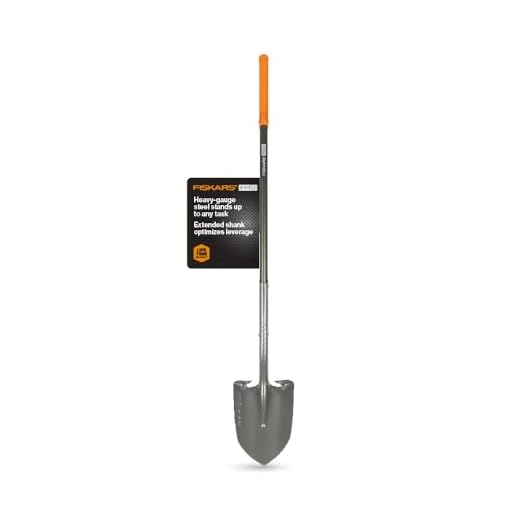
Shovels are essential tools used for various purposes, from digging trenches to gardening. One might wonder what type of steel is used to manufacture these versatile tools. Steel is the material of choice for shovels due to its durability, strength and corrosion resistance.
When it comes to the type of steel used for shovels, manufacturers often opt for high carbon steel or stainless steel. High carbon steel shovels are made from a steel alloy that contains a higher percentage of carbon, providing them with excellent strength and hardness. This makes them ideal for heavy-duty tasks, such as breaking through hard ground or digging in rocky terrain.
On the other hand, stainless steel shovels are made from a steel alloy that contains chromium, which enhances their resistance to rust and corrosion. This makes them a great choice for gardening and other outdoor applications where exposure to moisture is common. Stainless steel shovels also tend to be lighter in weight compared to high carbon steel shovels, making them easier to handle for extended periods.
In conclusion, the type of steel used for shovels depends on the intended purpose and preferences of the manufacturer. Whether it’s high carbon steel or stainless steel, shovels are designed to be strong, durable and resistant to the elements, ensuring that they can withstand the toughest of tasks.
What Type of Steel are Shovels Made From
Shovels are useful tools commonly used for digging, lifting, and moving materials such as soil, snow, and gravel. They are mainly made from steel due to its strength, durability, and resistance to wear and tear.
While there is no specific type of steel that is universally used for making shovels, they are typically made from a type of high carbon or tempered steel. These types of steel offer several desirable properties that make them suitable for shovel construction.
High Carbon Steel
High carbon steel contains a higher percentage of carbon compared to other steels. This results in a harder and stronger steel, making it ideal for the tough demands of shovel usage. The high carbon content provides increased resistance to chipping, bending, and breaking, ensuring that the shovel can withstand heavy use without easily deforming.
Shovels made from high carbon steel are also more resistant to wear and tear, enabling them to maintain their sharp edge and shape over time. This is particularly important for shovels used in digging and cutting through tough materials.
Tempered Steel
Tempered steel is another common choice for shovel construction. This type of steel undergoes a heat treatment process known as tempering, which involves heating the steel and then rapidly cooling it to increase its strength and hardness.
Tempered steel shovels are known for their excellent toughness and durability. They are less likely to break or deform under heavy loads or harsh conditions, making them suitable for heavy-duty applications.
Furthermore, tempered steel shovels have good resistance to corrosion, allowing them to withstand exposure to moisture and various environmental conditions without rusting or deteriorating.
It is worth noting that the specific composition and properties of steel used for shovel production can vary between manufacturers and different models. The choice of steel depends on various factors, including the intended use of the shovel and the desired balance between strength, durability, and cost.
| Type of Steel | Properties |
|---|---|
| High Carbon Steel | Hardness, Strength, Resistance to Wear |
| Tempered Steel | Toughness, Durability, Resistance to Corrosion |
Steel in Shovels
Shovels are commonly used tools that are made from various types of steel. The type of steel used in shovels depends on the specific demands and requirements of the application.
One of the most commonly used types of steel in shovels is carbon steel. Carbon steel is known for its strength and durability, making it a popular choice for shovel manufacturers. It is a low-cost material that can withstand heavy use and resist bending or breaking.
Another type of steel that is often used in shovels is stainless steel. Stainless steel is resistant to corrosion and rust, which makes it ideal for shovels that may come into contact with moisture or various chemicals. It is also known for its high tensile strength and ability to maintain its shape even under extreme conditions.
Some specialized shovels, such as those used in mining or construction, may be made from alloy steels. Alloy steels are made by combining iron with other elements such as chromium, nickel, or molybdenum. This results in a steel with enhanced properties such as increased hardness, toughness, and wear resistance.
Overall, the choice of steel in shovels depends on the specific requirements of the intended application. Factors such as strength, durability, resistance to corrosion, and cost all play a role in determining the type of steel used. Shovels made from carbon steel, stainless steel, or alloy steel can provide excellent performance and longevity when used in the appropriate setting.
Importance of Steel Selection
When it comes to manufacturing shovels, selecting the right type of steel is of utmost importance. The steel used in shovel construction plays a crucial role in determining the durability, strength, and performance of the tool.
One of the key factors to consider when selecting steel for shovels is its toughness. Shovels are subjected to heavy loads, intense forces, and various weather conditions, so they need to be able to withstand frequent use without breaking or bending. Tough steel provides the necessary strength to handle these demanding tasks.
Another important property to consider is the steel’s corrosion resistance. Shovels often come into contact with moisture, soil, and other corrosive substances. Using a steel that is resistant to rust and corrosion ensures that the shovel remains reliable and functional for a longer period.
The hardness of the steel is also a critical factor. Shovels need to be strong enough to penetrate the ground and cut through objects without getting dull or damaged. Choosing a steel with the right hardness level ensures that the shovel can endure repetitive impact and maintain its cutting edge.
Additionally, the ease of sharpening and maintaining the shovel should be taken into account. Steel that can be easily sharpened and maintained allows the tool to perform optimally throughout its lifespan. This reduces the need for frequent replacements and prolongs the overall usefulness of the shovel.
In conclusion, the selection of steel for shovels is crucial in determining the tool’s durability, strength, and performance. Considering factors such as toughness, corrosion resistance, hardness, and ease of maintenance ensures that shovels are reliable, long-lasting, and efficient in various demanding environments and tasks.
Common Steel Types for Shovels
Shovels are essential tools that come in various designs and sizes, used for digging, lifting, and moving materials like soil, gravel, or snow. They are constructed with different types of steel, depending on the intended use and durability requirements.
Here are some common steel types used for making shovels:
| Steel Type | Description |
|---|---|
| Carbon Steel | Carbon steel shovels are the most common type due to their affordability and decent durability. They are strong and resistant to wear and tear, making them suitable for general digging and gardening tasks. |
| Stainless Steel | Stainless steel shovels are highly resistant to rust and corrosion, making them ideal for working in humid or wet conditions. They offer excellent durability and are often used for heavy-duty landscaping or construction projects. |
| Tempered Steel | Tempered steel shovels are heat-treated to increase their hardness and strength. They are designed for tough digging tasks in rocky or compacted soils. These shovels are less likely to bend or break under heavy loads. |
| Aluminum Alloy | Aluminum alloy shovels are lightweight and resistant to rust, making them great for snow removal or lighter digging tasks. They may not be as durable as other steel types, but they are easier to handle and transport. |
It is important to consider the specific needs and conditions of your digging project when choosing a shovel made from a particular steel type. By selecting the right steel type, you can ensure that your shovel will provide the necessary strength and longevity for the job at hand.
Performance Factors of Steel
Steel is a popular material for manufacturing shovels due to its excellent performance in various conditions. Several key factors contribute to the performance of steel shovels:
1. Strength: Steel is known for its high strength, which allows shovels to withstand heavy loads and resist deformation during use. This makes steel shovels suitable for digging in tough soils or breaking through hard materials.
2. Durability: Steel shovels have excellent durability, making them long-lasting tools that can withstand repeated use without significant wear or damage. The hardness of steel helps to prevent bending or breaking during demanding tasks.
3. Corrosion resistance: Steel shovels often undergo coatings or treatments to enhance their resistance to corrosion. These protective measures help to prevent rust and extend the lifespan of the shovel, especially when used in outdoor or wet environments.
4. Sharpness: Steel can be sharpened to create a sharp edge on the shovel blades. This allows for more efficient digging and cutting through various materials. The ability to maintain a sharp edge is crucial for the shovel’s performance.
5. Weight: Steel shovels offer a balance between strength and weight. They are typically heavier than shovels made from other materials, but this additional weight can provide stability and improve the ability to penetrate hard or compacted soils.
6. Flexibility: Steel has a good balance of stiffness and flexibility, allowing the shovel to flex slightly without permanently deforming. This flexibility can help absorb impact and prevent the shovel from breaking or bending under heavy loads.
In conclusion, steel shovels offer a combination of strength, durability, corrosion resistance, sharpness, weight, and flexibility that make them excellent tools for various digging and excavation tasks. The specific characteristics of steel used in shovel production may vary depending on the intended use and the manufacturer’s design.










